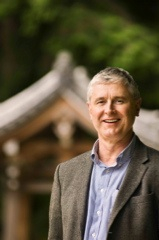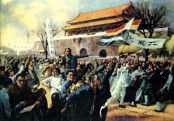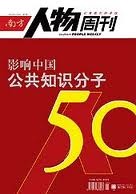Memo #73
Timothy Cheek – t.cheek [at] ubc.ca
 These are hard days for China’s public intellectuals. International media highlight crackdowns and repression, the recent disappearance and now apparent arrest of Ai Weiwei, incarceration and abuse of public interest lawyers, and the heavy-handed police presence on the streets of major Chinese cities to avert a “jasmine revolution” among Sunday shoppers. Six months after the controversy over the Nobel peace prize for China’s most prominent dissident, Liu Xiaobo, is this the unraveling of “the China model”?
These are hard days for China’s public intellectuals. International media highlight crackdowns and repression, the recent disappearance and now apparent arrest of Ai Weiwei, incarceration and abuse of public interest lawyers, and the heavy-handed police presence on the streets of major Chinese cities to avert a “jasmine revolution” among Sunday shoppers. Six months after the controversy over the Nobel peace prize for China’s most prominent dissident, Liu Xiaobo, is this the unraveling of “the China model”?
The China model of market economy with an authoritarian government is not unique to China. But it has been more successful in China than elsewhere and is likely to continue for many years. The recent crackdown on public intellectuals is consistent with the Chinese Communist Party’s “directed public sphere” that allows commercial media while carefully limiting its content.
The series of arrests, detentions, and disappearances are portrayed inside China as part of “patriotism.” This is defined in part as a rejection of international norms that are cast as the self-interested meddling of Western powers.
Shutting down intellectuals who spout inconvenient truths is the negative side of this push. The positive side is reflected in Beijing Postal University president Fang Binxing’s call for graduates to “Meld your own growth and talent with the progress of the country and the revitalization of the nation” and in the Party’s drive to promote loyal “strategic intellectuals” (zhanlüe zhishifenzi) to replace pesky, independent “public intellectuals.”
Our media has focused on the cases of repression. The bigger picture is the regime’s efforts to produce a loyal cadre of patriots and regime intellectuals. This is the working of China’s “directed public sphere.” The government has considerable resources, a great deal of talent, and a story that plays well at home. We would be foolish to think China is easily comparable to Egypt or Tunisia and unwise to hope that it is going to change its ways any time soon.
About the Author:
Timothy Cheek – Louis Cha Chair in Chinese Research, Institute of Asian Research, The University of British Columbia.
Links:
- China: the Big Chill, The New Yorker, April 2011
- Fang Binxing to College Graduates: “Meld Your Own Growth With The Progress of Your Country”, April 2011 (see Chinese version)
- Strategic Intellectuals, People’s Daily Web, September 2010 (in Chinese)
- Perspective… ChinaGeeks.org, March 2011
Related Memos:
- Chinese Artist/Activist Ai Weiwei Detained, April 7, 2011, Memo 71
- Why Scholar-Writers Yang Jiang and Qian Zhongshu are Important to China Today, January 18, 2011, Memo 48
- Our other Memos about China
- Our collection of Memos on the Origins of Social Protests in China

